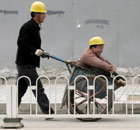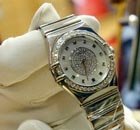Economy
Inflation less worrisome than asset bubble
(Xinhua)
Updated: 2010-03-20 20:55
 |
Large Medium Small |
BEIJING - The threat of inflation to China's economy is less worrisome compared with asset bubble, economists said Saturday at the China Development Forum 2010.
China's economy is facing a new round of growth in the coming two years, but the risks of inflation and asset bubble remain, said Fan Gang, secretary general of the China Reform Foundation.
Compared with inflation, tackling asset bubble is of greater importance because asset bubble, as one of the causes for this round of global financial crisis, is more dangerous, Fan said. He expected the country's economy to grow 8 to 9 percent this year in a "normal growth."
Despite government measures to curb property prices, China's property market grew at its fastest pace in 20 months in February, with housing prices in 70 major cities rising 10.7 percent from a year ago.
The issue of soaring housing prices, if not properly solved, was likely to cause social instability in China, said Zheng Yongnian, director of the East Asia Institute of the National University of Singapore.
During an online chat with Internet users last month, Premier Wen Jibao said he was determined to tame the "wild-horse" housing market and to keep prices at a reasonable level within his term as Premier.
Wen said the government would step up efforts to increase the supply of affordable houses, encourage reasonable house buying while curbing speculative demand, and punish developers who hoard lands and completed houses in anticipation of price increases.
China targets a rise of consumer price of around 3 percent this year, Wen said when delivering a government work report at the opening of the annual session of the National People's Congress on March 5.
The target, although challenging, could be realized, said Yao Jingyuan, chief economist of the National Bureau of Statistics.
The country is facing a range of forces that could push up consumer prices this year, including increasing global commodity prices, high inflation prospects and reform in resource products prices, Yao said.
However, ample grain supplies after harvest for six consecutive years and production capacity excess in many sectors would help ease inflation pressure, he said.












